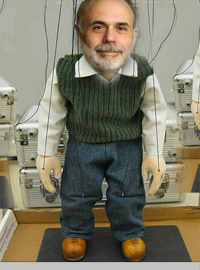| Against Bernanke’s Market Manipulations |
 |
|
By Quin Hillyer
Wednesday, August 10 2011 |
Try this thought experiment: You are sitting on a pile of cash or cash-equivalents. You are worried about the overall economy, and particularly about your nation’s debt. Inflation is almost nonexistent right now, but you know the most common way for nations to pay off debt is to inflate their currency. Your cash, therefore, may lose value – and it sure as heck won’t grow appreciably, even in the highest-yield CD you can find, because right now interest rates are negligible. In fact, the central bank’s official interest rates are, for all intents and purposes, zero. Big banks can borrow money for almost nothing (and thus lend it at historic-low rates), but they pay almost nothing for you to save your money in those banks’ accounts. So what do you do with your cash? Well, if you think the interest rates will stay low for the foreseeable future no matter what you do, then you might just sit tight anyway. After all, you can always borrow money and make capital investments next year, knowing that the same low rates will apply. Meanwhile, your cash is good, and you might as well stash it in your mattress. Moreover, if you think the economy will remain in the doldrums, then there’s almost nothing to be gained by investing, but there could be plenty to lose. But if you expect interest rates to start a slow, steady rise, not to high levels but at least by a few percentage points – in other words, back to low-normal – then your incentives are different. Suddenly, you have reason not to just sit on your cash, but to invest it and borrow even more money, also to invest, while the cost of borrowing and investment is almost crazily low. If you know the rates will be higher a year from now than they are today, then now is when it makes sense to put your money to use. When money is cheap, that’s when it makes sense to borrow and invest; but that’s only true if you think it won’t be cheap long. In sum, then, the best time to put your money to work, or for that matter the best time to buy a house, is when interest rates are incredibly low but starting to rise, or expected to rise soon. Suddenly, the rising rates could cause a race to invest, while the investing is still good. That’s why it made no sense on Tuesday for the Federal Reserve Board under Chairman Ben Bernanke to announce it would keep central-bank interest rates near zero for another two years. This was supposed to reassure investors who like low interest rates. Instead, it freezes them in place. Again, why invest now when there’s no fear that waiting will mean a missed opportunity? Furthermore, by announcing, in a highly unusual move, that rates will stay “exceptionally low” for two whole years, Bernanke signaled that he fears the economy will remain exceptionally weak for that same two years. Once digested, this signal of low expectations will dampen investor confidence, in effect becoming at least somewhat a self-fulfilling prophecy. Extremely easy money hasn’t cured the economy for three years now; why should it work now? Bernanke effectively also signaled lack of concern with the strength of the dollar. This will scare away foreign investors, not attract them, and it will also further undermine the case for the dollar to remain the world’s reserve currency. It also risks creation of yet another asset bubble, of a yet-unknown form, thus giving perspicacious investors reason to fear more economic instability in the future. For whatever reasons, a market rally on Tuesday that had seen the Dow Jones Industrial Average rise by 200 points immediately tanked once Bernanke made his announcement, dropping to a more-than-200 point loss before investors again turned on a dime and sent the Dow soaring to a 429-point gain by session’s end. At this writing on Wednesday morning, it again has lost exactly that same 429 points. Uncertainty, volatility and instability are the fruits of Bernanke’s manipulations. Bernanke would do far better to stop keeping rates artificially low, and instead express a willingness to let them rise when and if market forces dictate. The key is not to raise rates, but to stop manipulating them artificially. Then, with other tools at his disposal, he should work to strengthen the dollar. A strong dollar is a dollar that ratings agencies are more likely to respect. In short, the best way to jump-start the economy is to express confidence that the economy can thrive even with interest rates allowed to edge up on their own as the economy improves. A large proportion of a nation’s economic activity is based on an expectations game. Bernanke’s move on Tuesday does not lead to great expectations. |
Related Articles : |
























